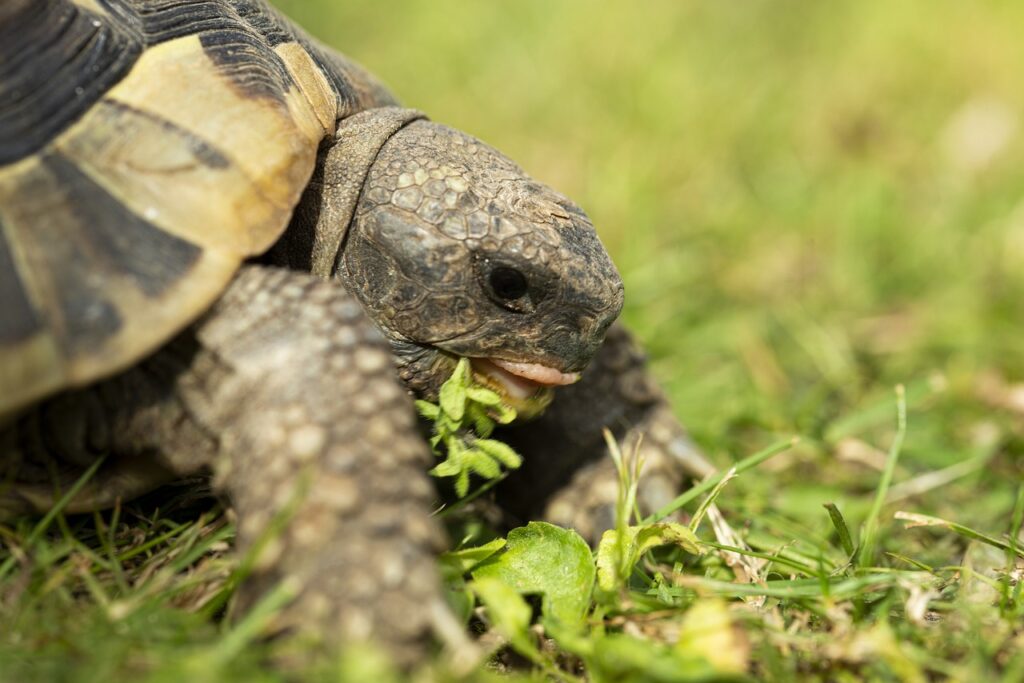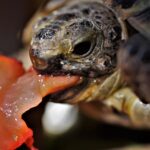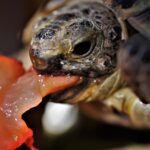
Image: Tortoise Meal feed Pixabay
Sulcata tortoises, also called African spurred tortoises, are amazing animals. But can they eat raspberries? Let’s find out.
These tortoises live in the Sahara Desert. They eat grasses and succulents. They need fibrous food for dental health and digestion.
Raspberries have lots of good stuff in them, but not for sulcatas. Their systems need high-fiber food with no sugar. Fruits can cause digestive issues.
In the past, people gave their tortoises too much fruit or protein-rich food. This led to obesity and bone disease. We should give them the right food based on what they need, not what we want.
Put a raspberry in front of a sulcata tortoise and see what happens!
Key Takeaways
- Sulcata tortoises can eat raspberries, but they should be given in moderation as a treat rather than a staple food in their diet.
- Raspberries are high in sugar and should only be given occasionally to avoid health issues such as obesity and digestive problems in tortoises.
- It is important to wash raspberries thoroughly before feeding them to tortoises to remove any pesticides or chemicals that may be present on the fruit.
- Feeding raspberries to tortoises can provide them with some additional nutrients and hydration, but they should still primarily be fed a diet of leafy greens, hay, and other vegetables.
- It is always recommended to consult with a veterinarian or reptile specialist to ensure that the diet of a sulcata tortoise is balanced and appropriate for their specific needs.
Can Sulcata Tortoises Eat Raspberries?
To ensure the well-being of your Sulcata tortoise, it’s important to understand whether it can eat raspberries. In order to make an informed decision regarding its diet, let’s dive into the traits and characteristics of Sulcata tortoises as well as their nutritional needs. This will help you determine if including raspberries in their diet is a viable option.
What are Sulcata Tortoises?

Image: Sulcata tortoise Wikimedia Commons CC 2.0
Sulcata tortoises, also known as African spurred tortoises, are a fascinating species native to the Sahara Desert. They have large size and raised scales on their shells, resembling furrows or ridges. One of the largest tortoise species in the world, they can be up to 30 inches long and weigh over 100 pounds!
Adapted to their arid environment, they have strong legs and powerful jaws for digging and grazing. Their lifespan can be up to 70 years, making them a great companion for dedicated keepers. They require special care due to their unique features and natural habitat.
Sulcata tortoises need warm climates with sunlight for basking – and their diet is mainly high-fiber plants like grasses, hay, greens, and succulents. It’s important to give them a variety of calcium and vitamins for optimal health.
These majestic creatures can store water in their bladder for long periods – a great adaptation for surviving drought in the desert! Ancient cultures respected them as sacred animals that symbolized longevity and wisdom.
In conclusion, sulcata tortoises are fascinating creatures from the Sahara Desert. They are impressive in size, appearance, and ability to adapt to tough conditions. With proper care, they can thrive as pets while honoring their natural heritage!
Nutritional Needs of Sulcata Tortoises
Sulcata tortoises need special diets to stay healthy. These should include lots of foods that give them the nutrients they need. To understand this better, let’s look at this table:
| Nutrient | Food |
|---|---|
| Calcium | Dark leafy greens, edible flowers |
| Fiber | Grasses, hay, cactus pads |
| Protein | Mazuri Tortoise Diet, insects |
| Vitamins | Fruits, vegetables |
Calcium is important and can be found in dark leafy greens and edible flowers. Fiber is also important and can be found in grasses, hay, and cactus pads. Protein sources include Mazuri Tortoise Diet and insects. Lastly, vitamins come from fruits and vegetables.
UVB light is needed to help make Vitamin D3, which helps with calcium absorption. Without it, they might get metabolic bone disease.
Reptile enthusiasts have noticed that their tortoises get healthier when they change their diet. They learned that to stay healthy, they need lots of different types of food. So, eat away, sulcata tortoises! Raspberries are waiting for you!
Benefits of Raspberries for Sulcata Tortoises

To ensure your sulcata tortoise’s well-being, explore the benefits of raspberries for them. Discover how raspberries are high in antioxidants, a good source of vitamin C, and contain fiber. These sub-sections highlight the advantages raspberries offer to your beloved pet.
High in Antioxidants
Raspberries are a great source of antioxidants. These help sulcata tortoises fight free radicals, which can cause cellular damage. Benefits include:
- Protection from cellular damage.
- Boosting the immune system.
- Healthy eyesight.
- Preventing inflammation.
- Supporting heart health.
Plus, they contain dietary fiber for healthy digestion, and essential minerals like manganese and potassium. And, according to a study, raspberries have one of the highest antioxidant capacities among commonly eaten fruits. So, let’s give a round of applause to raspberries – they can help tortoises fight scurvy and take their vitamin C game to new fruity heights!
Good Source of Vitamin C
Raspberries: A great natural source of Vitamin C for Sulcata tortoises! Here’s why they should be included in their diet:
- Essential nutrients, including Vitamin C, vital for boosting the immune system.
- Vitamin C helps protect them from various diseases.
- Antioxidants contribute to overall health and well-being.
- Fiber, potassium, and manganese available too.
- Feeding your tortoise raspberries regularly helps ensure they get necessary nutrients.
Raspberries offer more than just Vitamin C. Introduce them gradually to monitor response and suit their needs. Time to take action! Don’t miss out on this opportunity to enhance your tortoise’s diet with raspberries. Their deliciousness has plenty of benefits, including Vitamin C boost. Introduce this nutritious fruit into meals and watch them thrive. Your tortoise will thank you! Plus, they’ll have regular pooping adventures with the fiber boost.
Fiber Content
Gobbling up raspberries is renowned for giving sulcata tortoises plentiful perks, counting their fiber content. Fibrous things are critical for a healthy digestive system in these reptiles. Red and black raspberries both offer 6 and 8 grams of dietary fiber per cup, respectively. This means they both provide ample amounts to nourish digestion in the sulcata tortoise.
Raspberries are a superb supplement to the sulcata tortoise’s diet due to their high fiber content. According to Jennifer Coates, DVM, an authorised vet, raspberries are the ideal addition to the sulcata tortoise’s diet as they supply necessary fiber for a healthy gut.
Here’s the berry-good news: a raspberry a day keeps the vet bills away!
Risks of Feeding Raspberries to Sulcata Tortoises
To understand the risks of feeding raspberries to Sulcata tortoises, delve into the section, “Risks of Feeding Raspberries to Sulcata Tortoises.” Discover the potential digestive issues and high sugar content that these delightful fruits can pose.
High Sugar Content
Raspberries may not be the best food for Sulcata tortoises due to their high sugar content. This article looks at the risks associated with feeding these fruits to these reptiles.
- Too much sugar can cause obesity in Sulcata tortoises.
- Normally, these tortoises eat low-sugar, high-fiber vegetation.
- However, raspberries are full of fructose and glucose.
- Eating too many raspberries can damage the balance of nutrients in the tortoise’s digestive system.
It’s important to remember that raspberries shouldn’t be the main food for Sulcata tortoises. Even though they may enjoy them, it’s vital to think of their health first.
Raspberries also have small amounts of oxalates. These can stop calcium absorption in reptiles, possibly leading to metabolic bone disease.
Dr. Melissa Kaplan, a herpetologist and reptile expert, has found that high sugar diets have bad effects on many reptile species. So it’s wise to limit or avoid giving raspberries.
With this in mind, it’s clear that raspberries should only be given as occasional treats, not regular parts of the Sulcata tortoise’s diet. Be careful – your tortoise’s digestion could be in for a ‘raspberry rebellion’!
Potential Digestive Issues
Feeding raspberries to Sulcata Tortoises is not ideal, as it may lead to digestive issues. This is due to the high sugar content, lack of fiber, potential diarrhea, nutritional imbalance, and gastrointestinal discomfort. Moreover, it can strain their digestive system.
To keep them healthy, moderation and variety should be implemented when feeding them raspberries. Consult an expert if unsure about their dietary requirements. Doing so can help prevent potential digestive issues and ensure their overall well-being.
Recommendations for Feeding Raspberries to Sulcata Tortoises
To ensure that your Sulcata Tortoise can safely consume raspberries, follow these recommendations. Feed raspberries in moderation, considering their high sugar content. Take necessary precautions to ensure the tortoise’s overall health and well-being.
Moderation is Key
Moderation is a must when it comes to feeding raspberries to sulcata tortoises. This is to ensure their overall well-being and avoid any harm caused by overconsumption. Here are five key points to keep in mind:
- Raspberries should be seen as a treat, not the main course.
- Too many raspberries can lead to diarrhea and bloating.
- Introduce them gradually, allowing their digestive system to adjust.
- Monitor their response after consuming raspberries and consult a vet if needed.
- Variety is key, so make sure to rotate different fruits and veggies alongside raspberries.
It is also important to note that individual tortoises may have their own dietary restrictions or health conditions that require adjusted raspberry intake. It is recommended to consult a reptile vet for personalized feeding guidelines.
The importance of moderation can be seen in the story of Sheldon, a sulcata tortoise. His owner introduced him to raspberries as part of his daily meals, unaware of the consequences. Sheldon soon started experiencing digestive discomfort and irregular bowel movements.
Confused, the owner consulted a reptile vet. They explained that Sheldon’s symptoms were likely caused by an excessive intake of raspberries. The vet advised reducing raspberry consumption and diversifying his diet with other suitable foods.
By gradually decreasing the amount of raspberries and introducing more variety into Sheldon’s meals, his digestive issues resolved. This shows how moderation played a key role in maintaining Sheldon’s health and happiness.
In conclusion, while raspberries can be a nutritious occasional snack for sulcata tortoises, moderation is key for a balanced and thriving diet. Just remember: ‘Beware of their berry explosive personalities!’
Precautions to Take
Raspberries can be a yummy and nutritious snack for a sulcata tortoise. It’s important to take precautions for their wellbeing. Here are the key points:
- Limit the amount. Give raspberries as a treat, not as part of their regular diet.
- Wash them well to get rid of pesticides or other contaminants.
- No added sugars or preservatives. Stick to fresh raspberries for the highest nutrition.
- Portion control. Offer a small amount, especially if they’re not used to them.
- Observe for allergies. Monitor them after giving them raspberries to see if they have a reaction.
- Variety in diet. Raspberries should be just one part of a balanced and varied diet.
Overfeeding raspberries can lead to digestive issues or bad nutrition. So make sure the tortoise has other fruits, veggies, and high-fiber plant matter. Wild sulcata tortoises feed mainly on grasses, hay, and fibrous plants in their natural environment. Enjoy your raspberry treat, but don’t expect them to say ‘Thanks!’
Frequently Asked Questions
Q: Can sulcata tortoises eat raspberries?
A: Yes, sulcata tortoises can eat raspberries occasionally as a treat. However, they should not be a regular part of their diet.
Q: Are raspberries safe for sulcata tortoises?
A: Yes, raspberries are safe for sulcata tortoises to eat. Just make sure to feed them in moderation.
Q: How often should I give raspberries to my sulcata tortoise?
A: Raspberries should only be given to sulcata tortoises occasionally, maybe once or twice a month as a special treat.
Q: Can too many raspberries be harmful to sulcata tortoises?
A: Yes, feeding too many raspberries to sulcata tortoises can be harmful. Raspberries should only be given in small quantities as too much sugar can upset their digestive system.
Q: Should raspberries be the main part of a sulcata tortoise’s diet?
A: No, raspberries should not be the main part of a sulcata tortoise’s diet. They should primarily eat grasses, hay, and leafy greens for a balanced and healthy diet.
Q: What other fruits and vegetables can I feed my sulcata tortoise?
A: Other safe fruits and vegetables for sulcata tortoises include kale, dandelion greens, collard greens, carrots, and bell peppers. Always research before introducing any new food to their diet.
Conclusion
The sulcata tortoise is a herbivore, known for its unique diet. Research shows us that raspberries are not suitable for this type of tortoise. Grasses and leafy greens are best for their digestive health. Raspberries are tasty, but they don’t give the same nutrition as their preferred diet. Plus, the high sugar content in raspberries can lead to digestive issues and even obesity.
To care for your sulcata tortoise, feed them fresh grasses and leafy greens. Collard greens, dandelion greens, and turnip greens are good, as they give essential vitamins and minerals.
Also, provide a varied diet with other vegetables like carrots or cucumbers – but in small amounts. Wash fruits and vegetables carefully before you offer them, to remove pesticides or toxic substances. Monitor their diet and get advice from a reptile vet if needed.
By following these tips, you can keep your sulcata tortoise healthy, while avoiding any problems from unsuitable foods like raspberries.
References




